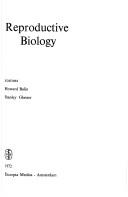
ISBN: 902192031X Year: 1972 Publisher: Amsterdam Excerpta Medica
Abstract | Keywords | Export | Availability | Bookmark
 Loading...
Loading...Choose an application
- Reference Manager
- EndNote
- RefWorks (Direct export to RefWorks)
Physiology: reproduction & development. Ages of life --- Pathological endocrinology --- Contraception. --- Reproduction. --- Reproduction --- Contraception --- Amphimixis --- Generation --- Pangenesis --- Procreation --- Biology --- Life (Biology) --- Physiology --- Sex (Biology) --- Embryology --- Generative organs --- Theriogenology --- Conception --- Birth control --- Reproductive rights --- Prevention
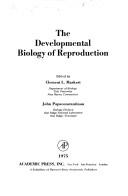
ISBN: 0126129797 0323153976 129947263X 9780126129793 Year: 1975 Volume: 33 Publisher: New York (N.Y.): Academic press,
Abstract | Keywords | Export | Availability | Bookmark
 Loading...
Loading...Choose an application
- Reference Manager
- EndNote
- RefWorks (Direct export to RefWorks)
General embryology. Developmental biology --- Developmental biology --- Reproduction --- Congresses --- congresses --- -Reproduction --- -#ABIB:aeco --- Amphimixis --- Generation --- Pangenesis --- Procreation --- Biology --- Life (Biology) --- Physiology --- Sex (Biology) --- Embryology --- Generative organs --- Theriogenology --- Development (Biology) --- Growth --- Ontogeny --- #ABIB:aeco --- Developmental biology - Congresses --- Reproduction - Congresses --- Reproduction - congresses

ISBN: 0471105384 Year: 1983 Publisher: Chichester ; New York ; Brisbane ; Toronto ; Singapore John Wiley & sons
Abstract | Keywords | Export | Availability | Bookmark
 Loading...
Loading...Choose an application
- Reference Manager
- EndNote
- RefWorks (Direct export to RefWorks)
Don de Jean-Pierre Contzen
Reproduction --- -Toxicology --- -Chemicals --- Medicine --- Pharmacology --- Poisoning --- Poisons --- Amphimixis --- Generation --- Pangenesis --- Procreation --- Biology --- Life (Biology) --- Physiology --- Sex (Biology) --- Embryology --- Generative organs --- Theriogenology --- Congresses --- Toxicology --- Agrotechnology and Food Sciences. Toxicology --- Congresses. --- Carcinogenesis, Mutagenesis, Teratology, Reproduction Toxicity --- -Congresses --- Carcinogenesis, Mutagenesis, Teratology, Reproduction Toxicity.
Book
ISBN: 9780857455024 0857455028 9780857455031 0857455036 1283655586 Year: 2012 Publisher: New York (N.Y.) Berghahn
Abstract | Keywords | Export | Availability | Bookmark
 Loading...
Loading...Choose an application
- Reference Manager
- EndNote
- RefWorks (Direct export to RefWorks)
The Biotechnology Act in Norway, one of the most restrictive in Europe, forbids egg donation and surrogacy and has rescinded the anonymity clause with respect to donor insemination. Thus, it limits people's choice as to how they can procreate within the boundaries of the nation state. The author pursues this significant datum ethnographically and addresses the issues surrounding contemporary biopolitics in Norway. This involves investigating such fundamental questions as the relation between individual and society, meanings of kinship and relatedness, the moral status of the embryo and the rol
Conception. --- Reproduction --- Social aspects --- Amphimixis --- Generation --- Pangenesis --- Procreation --- Biology --- Life (Biology) --- Physiology --- Sex (Biology) --- Embryology --- Generative organs --- Theriogenology --- Fertilization, Human --- Human fertilization --- Fertility, Human --- Fertilization (Biology) --- Human reproduction --- Contraception
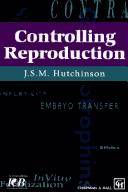
ISBN: 0412443104 Year: 1993 Publisher: London : London ; New York : Institute of Biology ; Chapman & Hall,
Abstract | Keywords | Export | Availability | Bookmark
 Loading...
Loading...Choose an application
- Reference Manager
- EndNote
- RefWorks (Direct export to RefWorks)
In this refreshingly integrated account, the author reviews reproductive function in humans, wild and domestic mammals, highlighting the loci suitable for manipulation. Controlling Reproduction is a practical comparative text which will be of interest to anyone concerned with mammalian reproduction.
Reproduction --- -#SBIB:314H233 --- #SBIB:AANKOOP --- Amphimixis --- Generation --- Pangenesis --- Procreation --- Biology --- Life (Biology) --- Physiology --- Sex (Biology) --- Embryology --- Generative organs --- Theriogenology --- Regulation --- Geboorteregeling --- Reproduction. --- Regulation. --- #SBIB:314H233 --- Regulation of reproduction --- Biological control systems
Book
ISBN: 9781107132931 9781316459386 9781107589582 1316459381 1108585310 1107589584 1107132932 1108624928 Year: 2018 Publisher: Cambridge : Cambridge University Press,
Abstract | Keywords | Export | Availability | Bookmark
 Loading...
Loading...Choose an application
- Reference Manager
- EndNote
- RefWorks (Direct export to RefWorks)
Generation of Animals is one of Aristotle's most mature, sophisticated, and carefully crafted scientific writings. His overall goal is to provide a comprehensive and systematic account of how animals reproduce, including a study of their reproductive organs, what we would call fertilization, embryogenesis, and organogenesis. In this book, international experts present thirteen original essays providing a philosophically and historically informed introduction to this important work. They shed light on the unity and structure of the Generation of Animals, the main theses that Aristotle defends in the work, and the method of inquiry he adopts. They also open up new avenues of exploration of this difficult and still largely unexplored work. The volume will be essential for scholars and students of ancient philosophy as well as of the history and philosophy of science.
Reproduction --- Animals (Philosophy) --- Aristotle. --- Reproduction. --- Animals (Philosophy). --- Philosophy --- Amphimixis --- Generation --- Pangenesis --- Procreation --- Biology --- Life (Biology) --- Physiology --- Sex (Biology) --- Embryology --- Generative organs --- Theriogenology --- Aristoteles. --- Animals. --- On the generation of animals (Aristotle). --- Aristotle. - On the generation of animals
Book
ISBN: 9535170430 9535108697 Year: 2012 Publisher: IntechOpen
Abstract | Keywords | Export | Availability | Bookmark
 Loading...
Loading...Choose an application
- Reference Manager
- EndNote
- RefWorks (Direct export to RefWorks)
This small-sized book concentrates on highlighting some practical issues mainly related to infertility and assisted reproduction. You will find detailed answers for many controversial issues in this field.
Reproduction. --- Reproductive technology. --- ART (Assisted reproductive technology) --- Assisted reproduction --- Assisted reproductive technology --- Reproduction --- Reproductive techniques --- Biotechnology --- Amphimixis --- Generation --- Pangenesis --- Procreation --- Biology --- Life (Biology) --- Physiology --- Sex (Biology) --- Embryology --- Generative organs --- Theriogenology --- Technological innovations --- Infertility & fertilization
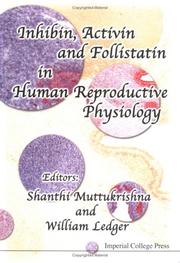
ISBN: 1281866016 9786611866013 1848161476 9781848161474 9781281866011 9781860942051 1860942059 Year: 2001 Publisher: London : River Edge, NJ : Imperial College Press ; Distributed by World Scientific Pub.,
Abstract | Keywords | Export | Availability | Bookmark
 Loading...
Loading...Choose an application
- Reference Manager
- EndNote
- RefWorks (Direct export to RefWorks)
An understanding of the participation of inhibin and activin in the regulation of the ovary and testis has provided illuminating insights into the physiology and pathology of human gonadal function. Rapid progress has been made in both reproductive physiology and possible applications in clinical practice. In addition, the discovery that both inhibin and activin are placental hormones with altered secretion in disease states, such as pre-eclampsia, has proven to be one of the most exciting aspects of work in this area of human biology. This book comprehensively reviews the current state of k
Inhibin. --- Glycoproteins. --- Pregnancy --- Reproduction --- Amphimixis --- Generation --- Pangenesis --- Procreation --- Biology --- Life (Biology) --- Physiology --- Sex (Biology) --- Embryology --- Generative organs --- Theriogenology --- Gestation --- Conception --- Mucroproteins --- Glycoconjugates --- Proteins --- Glycoproteins --- Hormones, Sex --- Peptide hormones --- Transforming growth factors-beta --- Physiological aspects.
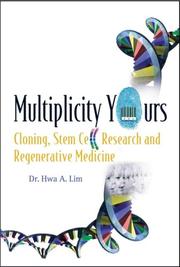
ISBN: 1281373192 9786611373191 9812773177 9789812773173 9781281373199 9789812568663 9812568662 9789812568656 9812568654 Year: 2006 Publisher: Singapore ; Hackensack, NJ : World Scientific,
Abstract | Keywords | Export | Availability | Bookmark
 Loading...
Loading...Choose an application
- Reference Manager
- EndNote
- RefWorks (Direct export to RefWorks)
Cloning. --- Cloning --- Stem cells --- Reproduction. --- Genomics. --- Genome research --- Genomes --- Molecular genetics --- Amphimixis --- Generation --- Pangenesis --- Procreation --- Biology --- Life (Biology) --- Physiology --- Sex (Biology) --- Embryology --- Generative organs --- Theriogenology --- Genetic engineering --- Reproduction, Asexual --- Moral and ethical aspects. --- Research. --- Research --- Human cloning.
Book
ISBN: 900441133X 9004411267 9789004411265 9789004411333 Year: 2020 Publisher: Leiden, The Netherlands ; Boston : Brill,
Abstract | Keywords | Export | Availability | Bookmark
 Loading...
Loading...Choose an application
- Reference Manager
- EndNote
- RefWorks (Direct export to RefWorks)
"Aristotle's De Animalibus was an important source of zoological knowledge for the ancient Greeks and for medieval Arabs and Europeans. In the thirteenth century, the work was twice translated into Latin. One translation was produced directly from the Greek by William of Moerbeke. An earlier translation, made available as a critical edition in the present volume for the first time, was produced through an intermediary Arabic translation (Kitāb al-Ḥayawān) by Michael Scot (1175--c. 1232). Scot's translation was one of the main sources of knowledge on animals in Europe and widely used until well into the fifteenth century. As a faithful translation of a translation produced by a Syriac-speaking Christian, the text contributes to our knowledge of Middle Arabic. The De Animalibus is composed of three sections: History of Animals (ten books), Parts of Animals (four books) and Generation of Animals (five books). Parts of Animals and Generation of Animals were published by Brill as Volumes 5.2 and 5.3 of the book series ASL in 1998 (ASL 5.2) and 1992 (ASL 5.3). The present Volume 5.1.a contains the first section of Scot's translation of History of Animals: the general introduction and books 1--3, with Notes. Editions of the two concluding parts of History of Animals, ASL 5.1.b, books 4--6 and ASL 5.1.c, books 7--10, are in preparation. Complete Latin-Arabic and Arabic-Latin indices of History of Animals will be published in due course".
Zoology --- Reproduction --- Amphimixis --- Generation --- Pangenesis --- Procreation --- Biology --- Life (Biology) --- Physiology --- Sex (Biology) --- Embryology --- Generative organs --- Theriogenology --- Pre-Linnaean works of zoology --- Pre-Linnean works of zoology --- Aristotle. --- Zoology - Pre-Linnean works --- Reproduction - Early works to 1800 --- Aristotle. - Historia animalium

 Search
Search Feedback
Feedback About UniCat
About UniCat  Help
Help News
News